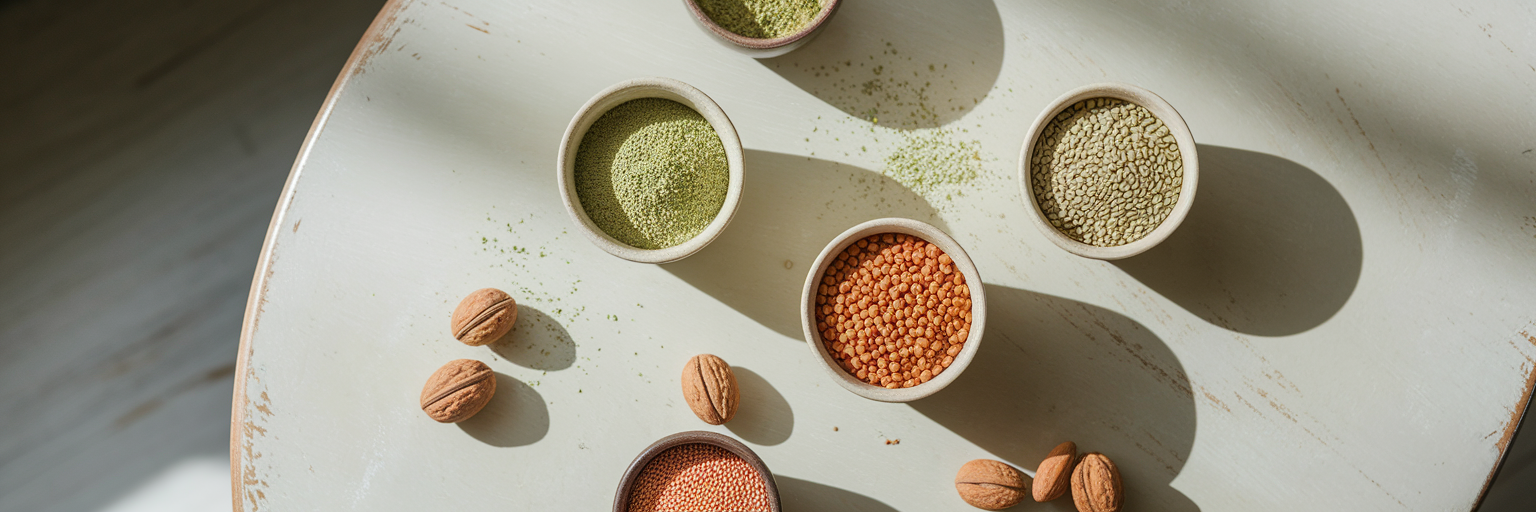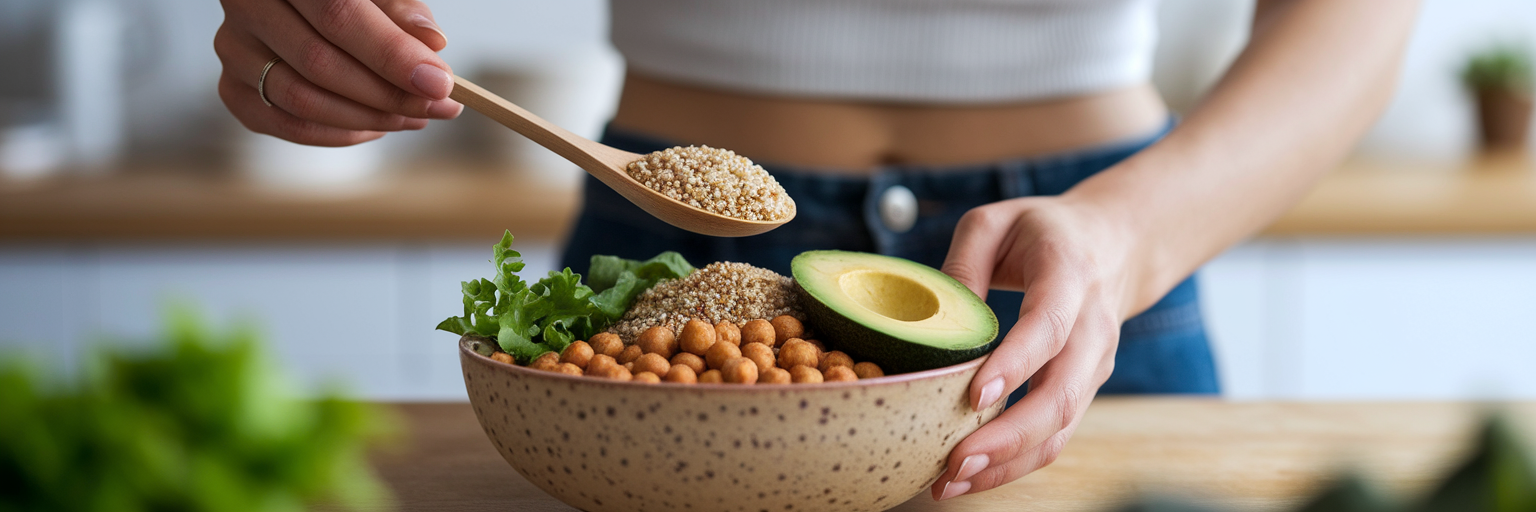Understanding the Protein and Hormone Connection
Have you ever felt like you’re doing everything right in your fitness routine but still hitting a wall? You get enough sleep but feel tired, your mood is unpredictable, and your progress feels stalled. We’ve all been there. That frustration often points not to a lack of effort, but to a gap in nutrition. The conversation about how to balance hormones naturally often starts right on your plate, specifically with protein.
Proteins are constructed from amino acids, which are the fundamental building blocks for your body’s hormones. Think of amino acids as the essential ingredients in the recipe for your body's chemical messengers. Without enough of them, production slows down, and the entire system can get out of sync.
Key hormones like estrogen and progesterone, which regulate everything from your menstrual cycle and mood to your metabolism, depend on a steady supply of these protein building blocks. When your intake is low, your body may struggle to maintain this delicate balance. For active women, the effects are noticeable. Unbalanced hormones can lead to energy slumps during workouts, mood swings that derail your motivation, and less efficient muscle recovery. Getting enough quality protein is the foundation for keeping this internal communication network running smoothly.
The Unique Advantages of Plant-Based Protein for Women

Now that we know protein is essential for hormonal harmony, a new question arises: does the source of that protein matter? For women’s health, the answer is a resounding yes. Choosing a plant based protein for women isn't just about meeting your daily macro goals; it’s about providing your body with a full spectrum of supportive nutrients that animal-based proteins simply don't offer.
Fighting Inflammation Naturally
Chronic inflammation can disrupt your endocrine system, interfering with hormone signaling. Many plant proteins are rich in compounds that have anti-inflammatory properties. By helping to calm systemic inflammation, these proteins create a better environment for your hormones to function optimally.
The Power of Fiber for Hormone Detox
Here’s a benefit you won’t find in whey or casein: fiber. Plant-based proteins are often packaged with plenty of it. Fiber is crucial for healthy digestion and supports your liver in a process called hormone detoxification. It helps your body efficiently process and eliminate excess hormones, like estrogen, preventing buildups that can lead to imbalances.
A Boost of Phytonutrients and Antioxidants
Intense exercise, while great for you, also creates oxidative stress. Plant-based foods are packed with phytonutrients and antioxidants, which are powerful compounds that help protect your cells from this stress. These nutrients are some of the best hormone balancing foods for women, supporting overall wellness from the inside out. If you're curious to learn more about holistic health, you can explore additional insights on our Beyond Good Foods blog.
Top Vegan Proteins for Hormonal Support and Fitness
Finding the right protein can feel like a personal journey, and what works for one person might not be the best fit for another. To help you get started, we've put together a guide to some of the most effective vegan proteins for active women. For an even more detailed comparison, you can review our guide to the best protein powders available.
- Pea Protein: Often called the muscle-building star of the plant world, pea protein is rich in branched-chain amino acids (BCAAs) that are vital for post-workout recovery. It’s also highly digestible, making it one of the best vegan protein for muscle gain options without the bloating some other proteins can cause. It's a fantastic base for supplements, which is why we use it in products like our Chocolate Vegan Protein.
- Hemp Protein: Think of hemp as the balancing protein. It contains a beneficial ratio of omega-6 to omega-3 fatty acids, which helps manage inflammation and can ease PMS symptoms. It’s also a great source of magnesium and zinc, two minerals essential for hormonal health.
- Soy (Edamame & Tofu): Let’s clear the air on soy. The phytoestrogens found in organic, minimally processed soy can gently support the body's estrogen levels. This can be particularly helpful for women experiencing hormonal fluctuations, such as during perimenopause.
- Pumpkin Seed Protein: This is a true mineral powerhouse. Pumpkin seeds are loaded with magnesium, which is fantastic for managing stress and improving sleep quality. They also provide zinc, a key mineral involved in the production of several hormones.
- Lentils & Chickpeas: Don't overlook these humble whole-food heroes. They offer a powerful combination of protein and complex carbohydrates, providing the sustained energy you need to power through workouts and your day.
| Protein Source | Key Benefit for Active Women | Best For... | Key Nutrients |
|---|---|---|---|
| Pea Protein | Excellent for muscle repair and growth | Post-workout recovery smoothies | High in BCAAs (Leucine, Isoleucine, Valine), Lysine |
| Hemp Protein | Reduces inflammation and supports mood | Daily balance, adding to oatmeal or yogurt | Omega-3 & Omega-6 fatty acids, Magnesium, Zinc |
| Pumpkin Seed Protein | Supports stress management and hormone production | Evening smoothies or snacks to promote relaxation | Magnesium, Zinc, Iron |
Note: This table compares popular protein powder options to help you choose based on your primary fitness and wellness goals. Whole-food sources like lentils and soy offer different benefits, including higher fiber content.
Practical Ways to Boost Your Protein Intake

Incorporating more vegan protein for hormonal balance doesn't have to be complicated or feel like a chore. It’s about making small, smart additions to the meals you already enjoy. Here’s how you can easily weave more protein into your day.
Power Up Your Breakfast
Starting your day with protein is key to stabilizing blood sugar and preventing that mid-morning energy crash. Try adding a scoop of vegan protein powder to your oatmeal or morning smoothie. It’s a simple step that keeps you feeling full and focused for hours.
Build a Better Lunch Bowl
Move beyond a simple green salad. Make your lunch more satisfying and nutritionally complete by adding a cup of chickpeas, a serving of baked tofu, or a scoop of lentils. These additions turn a light meal into a powerhouse of sustained energy.
Rethink Your Dinner Plate
Dinner is a great opportunity to get creative. Instead of ground meat, try making tacos with seasoned lentils. A stir-fry with tempeh and your favorite vegetables is another quick, delicious, and protein-packed option that comes together in minutes.
Smart Snacking and Smoothies
Fuel your workouts and bridge the gap between meals with protein-rich snacks. A post-workout smoothie made with pea protein is perfect for muscle recovery. For a quick bite, a handful of almonds or pumpkin seeds can provide the energy you need. For more inspiration, check out these 3 Easy Vegan Protein Recipes You'll Actually Crave.
Key Nutrients for the Active Vegan Woman
A well-planned vegan diet can absolutely support a demanding, active lifestyle. However, it’s important to be mindful of a few key nutrients to ensure your body is getting everything it needs to perform at its best. As a 2020 study in the Strength & Conditioning Journal confirms, paying attention to these details is essential for peak athletic performance.
- Iron: Plant-based (non-heme) iron isn't absorbed as easily as its animal-based counterpart. The fix is simple: pair iron-rich foods like spinach, lentils, and tofu with a source of Vitamin C, like bell peppers, broccoli, or citrus fruits, to significantly boost absorption.
- Vitamin B12: This is one nutrient you can't get from plants. For anyone following a vegan diet, taking a reliable B12 supplement is the most effective way to meet your needs and support your energy levels and nervous system.
- Calcium and Vitamin D: These two work together to maintain strong bones, which is critical for anyone engaged in high-impact activities. Look for fortified plant milks and yogurts, and make sure you're getting enough Vitamin D from safe sun exposure or a supplement.
Ultimately, the best approach is to listen to your body and consider consulting with a registered dietitian to tailor a plan that’s right for you. If you’re ready to support your active lifestyle, feel free to explore the full range of Beyond Good Foods plant-based supplements. We hope this article helps you on your wellness journey—feel free to share it with a friend who might find it useful!



